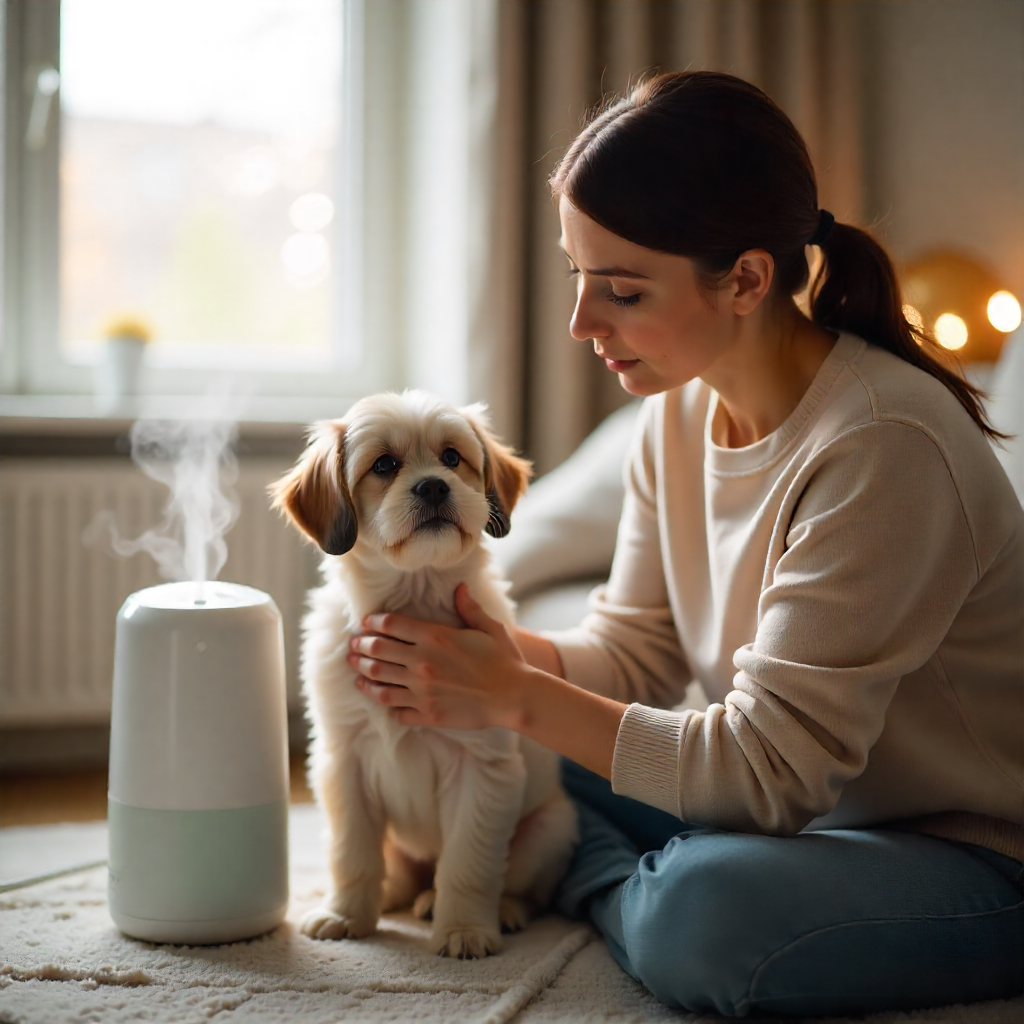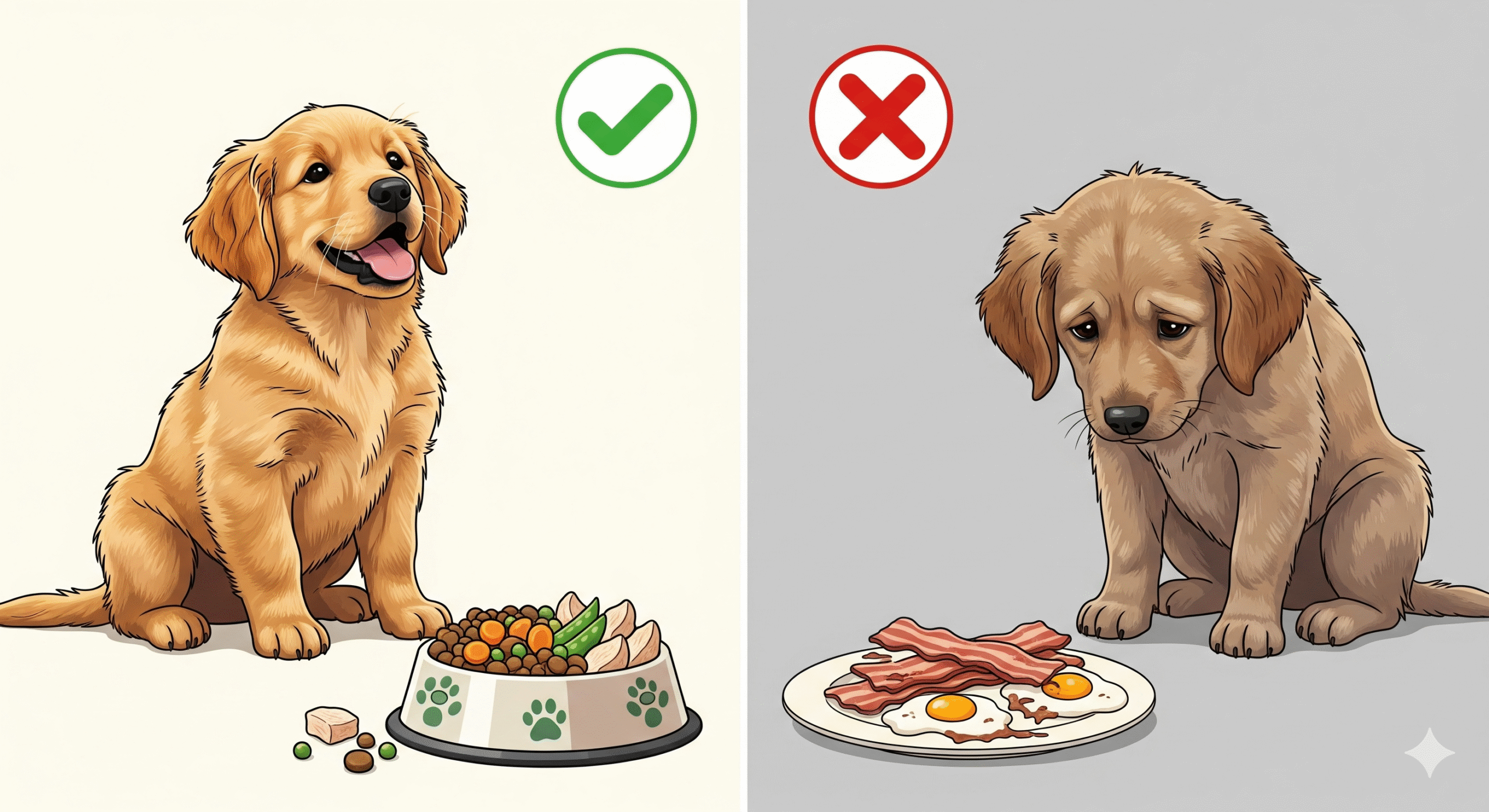Bringing home a new puppy is a whirlwind of joy, playful antics, and… worrying about every little sneeze. If your furry friend has suddenly developed a persistent, hacking cough that sounds like they’re choking on something, you’re likely dealing with one of the most common canine ailments: kennel cough.
While hearing your puppy cough can be alarming, especially for new pet parents, kennel cough is often highly treatable. This comprehensive guide will walk you through everything you need to know about kennel cough in puppies, from identifying the classic symptoms and understanding its causes to providing safe, effective home care and knowing precisely when to call the veterinarian. 🩺
What Exactly is Kennel Cough? 🤔
Kennel cough, officially known as Canine Infectious Tracheobronchitis, is not a single disease but a complex of highly contagious respiratory infections. Think of it like the common cold or flu in humans. It inflames a puppy’s voice box (larynx) and windpipe (trachea), leading to that characteristic, harsh cough.
Puppies are particularly susceptible because their immune systems are still developing. Even with vaccinations, their bodies are less equipped to fight off infections compared to healthy adult dogs. The name “kennel cough” comes from its tendency to spread rapidly in places where dogs are in close contact, such as boarding kennels, doggy daycares, dog parks, and shelters.
The Primary Culprits: It’s Rarely Just One Bug 🦠
Several pathogens can cause kennel cough alone or, more commonly, in combination. The most frequent offenders are:
- Bordetella bronchiseptica: This is the bacteria most often associated with kennel cough. It attaches to the delicate hairs (cilia) in the respiratory tract, preventing them from clearing debris and pathogens, which makes the puppy vulnerable to other infections.
- Canine Parainfluenza Virus (CPIV): A major viral player that damages the respiratory tract, paving the way for secondary bacterial infections like Bordetella.
- Canine Adenovirus Type 2: Another virus that contributes to respiratory illness and cough.
- Canine Distemper Virus: A very serious virus that can initially present with respiratory symptoms like kennel cough.
- Mycoplasma spp.: A type of bacteria that can contribute to the disease.
Expert Insight: Dr. Amelia Vance, DVM, explains, “The damage from a primary viral infection like Parainfluenza creates the perfect environment for Bordetella to take hold. This one-two punch is why the illness can be so stubborn and why we often see it spread so effectively in social settings.”
Recognizing the Symptoms: Does My Puppy Have Kennel Cough? 🚨
The symptoms of kennel cough can range from mild to severe, but the hallmark sign is a persistent, forceful cough. Here’s what to listen and look for:
The Classic Signs ✔️
- A loud, hacking cough: This is the #1 symptom. It often sounds like a “honking” noise, as if something is stuck in your puppy’s throat.
- Gagging or retching: The coughing fits can be so intense that they often end with your puppy gagging, retching, or bringing up white, foamy phlegm. This is frequently mistaken for vomiting.
- Cough induced by excitement or pressure: You might notice the cough gets worse when your puppy gets excited, pulls on their collar, or when you gently press on their trachea.
Other Possible Symptoms 🤧
In more severe cases, or if the puppy’s immune system is struggling, you may also see:
- Sneezing
- Runny nose
- Lethargy or decreased energy
- Loss of appetite
- Low-grade fever
Crucial Note: While kennel cough itself is often mild, the symptoms can mimic more dangerous conditions like canine distemper, heart disease, pneumonia, or a foreign object stuck in the throat. This is why a proper veterinary diagnosis is essential.
How is Kennel Cough Diagnosed and Treated? 🩺
If you suspect your puppy has kennel cough, your first step should always be a call to your veterinarian.
The Veterinary Visit: What to Expect
Your vet will typically:
- Take a history: They’ll ask about your puppy’s symptoms, vaccination record, and any recent exposure to other dogs.
- Perform a physical exam: They will listen to your puppy’s heart and lungs and gently feel their throat to check for a cough reflex.
- Run diagnostic tests (if needed): In straightforward cases, tests may not be necessary. However, if the cough is severe or prolonged, your vet may recommend chest X-rays to rule out pneumonia or blood work to check overall health.
Professional Treatment Options 💊
Treatment depends on the severity:
- Mild Cases: Often, no antibiotics are needed as the illness is viral. The vet may prescribe a cough suppressant to help your puppy (and you!) get some rest.
- Moderate to Severe Cases: If a bacterial infection is suspected or the puppy is very young, antibiotics will be prescribed to prevent secondary infections like pneumonia.
- Supportive Care: Your vet might recommend a nebulizer or steam therapy to help loosen mucus and soothe the airways.
Kennel Cough Home Care: Your Action Plan for Recovery 🏡❤️
For mild cases, your veterinarian will likely send you home with a plan for supportive care. Here’s how you can make your puppy comfortable and help them recover faster.
1. Environmental Management
- Use a Humidifier: Run a cool-mist humidifier near your puppy’s bed. The moist air will help soothe their irritated airways and loosen any mucus. A great alternative is taking them into the bathroom while you run a hot shower to create a steamy environment.
- Eliminate Irritants: Avoid cigarette smoke, strong household cleaners, aerosol sprays, and scented candles, as these can further irritate their respiratory tract.
- Provide a Quiet, Comfortable Space: Ensure your puppy has a warm, draft-free place to rest. Recovery requires energy, so limit playdates and overly excitable activities.
2. Hydration and Nutrition 🍗💧
- Encourage Water Intake: Keeping hydrated is vital. Ensure fresh, clean water is always available. If your puppy isn’t drinking, try offering ice cubes or low-sodium chicken broth.
- Appetizing Food: If their appetite is low, try warming up their regular food or offering a bland diet like plain, boiled chicken and rice, which is easy to eat and digest.
3. The “Collar vs. Harness” Debate
This is critical! Any pressure on the trachea will trigger a coughing fit.
- 🚫 Stop using a collar immediately for walks or any time you need to leash your puppy.
- ✅ Switch to a well-fitting harness that distributes pressure across the chest and shoulders, avoiding the neck entirely.
4. Know What NOT to Do ❌
- Do not use human over-the-counter cough medicines. Many contain ingredients like xylitol or acetaminophen that are highly toxic to dogs.
- Do not force exercise. Short, gentle potty breaks are all that’s needed until the cough has significantly improved.
- Do not take your puppy to public places like dog parks or pet stores. They are highly contagious and can spread it to other dogs.
When to Escalate: Emergency Red Flags 🚑
While most cases resolve with care, kennel cough can progress to life-threatening pneumonia, especially in young puppies. Contact your vet immediately or go to an emergency clinic if you see any of these warning signs:
- Lethargy that is severe (your puppy won’t get up or play at all).
- Complete loss of appetite for more than 24 hours.
- Difficulty breathing (rapid breaths, using stomach muscles to breathe, noisy breathing).
- Nasal discharge that is green or yellow.
- A fever (over 103°F/39.4°C).
- Coughing that continues to worsen instead of improve.
Prevention: How to Protect Your Puppy 🛡️
The best strategy is always prevention.
- Vaccination: The Bordetella vaccine is a core part of puppy preventative care. It comes in injectable, intranasal, and oral forms. While it doesn’t protect against every strain, it significantly reduces the severity and duration of illness if your puppy does get infected. It’s essential for any puppy that will be socialized, boarded, or go to grooming.
- Smart Socialization: Avoid high-risk areas like dog parks and pet stores until your puppy is fully vaccinated (usually around 16-18 weeks). Instead, arrange playdates with known, healthy, and vaccinated dogs in controlled environments.
- Hygiene: The pathogens that cause kennel cough can live on surfaces. Regularly clean food and water bowls, toys, and bedding, especially after contact with other dogs.

Conclusion: Patience and Care are Key
Dealing with kennel cough in your puppy can be a stressful experience, but armed with the right knowledge, you can navigate it confidently. Remember, the hallmark honking cough, while scary-sounding, is often manageable with supportive home care like humidity, rest, and a harness. Your most important jobs are monitoring for those emergency red flags and providing a calm, comfortable environment for recovery. When in doubt, always err on the side of caution and consult your veterinarian.
Has your puppy ever battled kennel cough? What tips helped them recover? Share your experiences and advice in the comments below to help other pet parents! 🐾
Dietary Mishaps & Intestinal Troubles
Puppies are notorious for eating things they shouldn’t, from grass and spoiled food to household objects. This often leads to vomiting and diarrhea, which can be scary for a new owner. While a single episode might not be an emergency, prolonged diarrhea can quickly lead to dangerous dehydration in a small puppy.
Learn more: Puppy Diarrhea Guide





